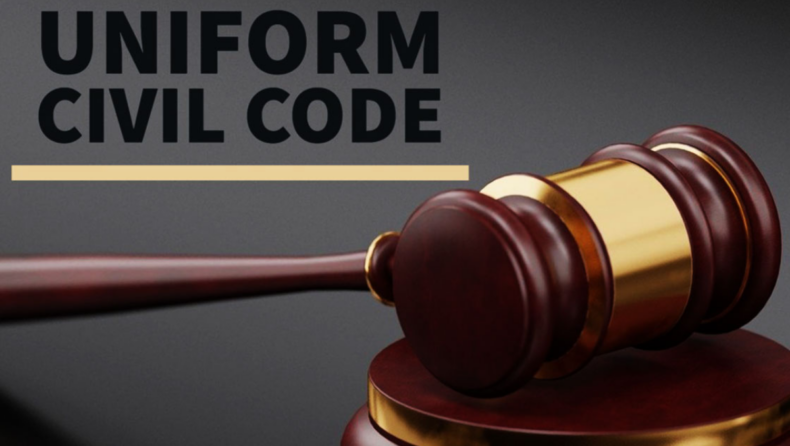The debate regarding the issue of the Uniform Civil Code has been ongoing since independence. Due to the absence of the Uniform Civil Code, the country has suffered a lot since independence. The unequal treatment of women in various religions has made the Uniform Civil Code a necessity in the country to protect their rights.

The Uniform Civil Code (UCC), as defined under Article 44 of the Indian Constitution, states that it is the duty of the state to secure the Uniform Civil Code for the citizens of India. UCC’s goal is to achieve “One Nation-One Law.” Personal laws are separated from public law and cover marriage, divorce, inheritance, adoption, and maintenance.
The topic of UCC came into the picture mainly after the Shah Bano case, where the apex court raised its voice for the implementation of UCC. In this case, the husband of Shah Bano refused to pay her money after their divorce. The Supreme Court, in its judgment, said, “A common civil code will help the cause of national integration by removing disparate loyalties to laws that have conflicting ideologies.”
Today, UCC is a hot topic of discussion in the country. It can often be seen that debates are being organised on UCC in the media houses. There may be two reasons why UCC is often in the news today. First, some people are trying to take political advantage in the name of UCC. The next reason is that some discuss UCC for the betterment of people.
India is a heterogeneous nation, with people from different religions, cultures, castes, and genders living together in harmony. Due to the diverse nature of the country, implementing a uniform civil code is not easy, but despite that, Goa became the 1st and only state to implement UCC in the country. The states of Uttar Pradesh and Uttarakhand have also shown interest in implementing UCC and say UCC is the need of the hour and the state governments wish to take appropriate measures to further its implementation.
Women in the country continue to face discrimination on a variety of issues, including equal rights with men, inheritance, marriage, divorce, adoption, and so on. UCC can bring the required social and economic changes to society, which will help improve women’s situation in the country. UCC can also work as an agent to promote uniformity and can also help to cut off some orthodox religious rules.
Every religion in the country has personal laws, which is the reason for so many religious controversies that go around the country. Talking about personal laws, we must speak about the triple talaq law, which is being abolished now. Triple talaq was a controversial law, where a Muslim man could divorce his wife by saying the word “talaq” three times in a sitting, that too, without the knowledge of his wife. The triple talaq law was struck down in 2017, after the landmark judgement of the Shayara Bano vs Union of India case.
Why is UCC in the news recently?
The recent case for which the topic UCC came into the news was the hijab row in Karnataka. The issue that caught the eye of the nation was the hijab ban. The issue started when a female student was not allowed to enter the college campus for not wearing the uniform prescribed by the college. This resulted in a nationwide debate about freedom of religion, expression, and essential religious practices. To avoid such controversial things, the implementation of UCC is the need of the hour.
A good number of people think that UCC is a political agenda of the ruling party, but it is not a political agenda. It will play a key role in bringing unity to the country through a structural change in society and will also lead to gender equality. The implementation of UCC could correct all the wrongdoings by the leaders after the partition. The UCC is a step towards integrating and strengthening the secular ideals of India.
If UCC gets implemented, it will ensure the empowerment of women because it will end practices like polygamy, which are still relevant in Islamic law and are highly unfair to women. Recently, there has been a lot of debate for and against UCC. But one of the most important voices to be raised in favor of UCC is the Supreme Court, which says it is “an unaddressed constitutional expectation” and had hoped and expected that the state would endeavor to secure for the citizens a uniform civil code throughout the territories of India.
The complex diversity of India makes the implementation of UCC difficult. But if the country needs to progress and if people need to live in a harmonious society where everyone is treated equally, accepting and implementing UCC is the need of the hour.













